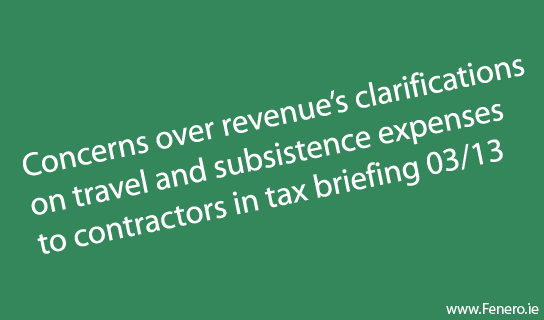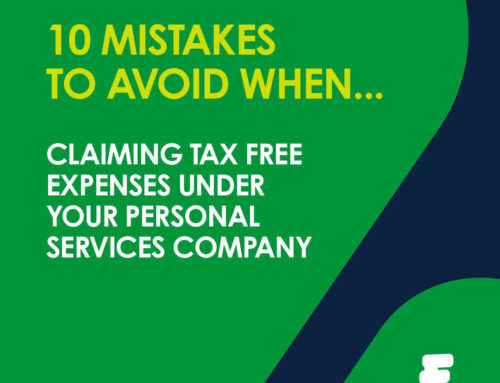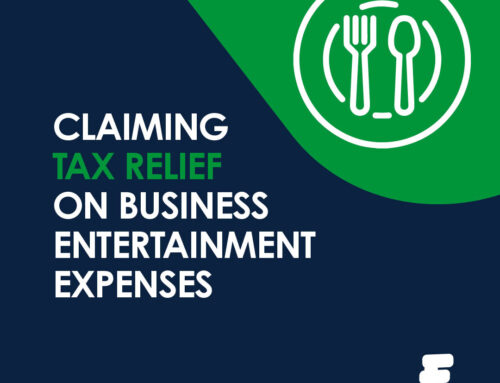Revenue’s Tax Briefing 03/13
If you have not come across the concept of “normal place of work” before, what follows might well sound like a lot of abstract theoretical debate. If you are a contractor however or working within this sector, you will no doubt be well aware of the existing guidance on normal place of work, travel and subsistence rules and have your own strong opinions on them.
With the Revenue’s National Project on Contractors well underway, the Irish Tax Institute asked the Revenue to issue further guidance on their position in relation to the treatment of travel and subsistence expenses for contractors in specific scenarios such as:
– Where regular intra-site travel is required
– Where multiple contracts are in place
– Where several months are spent working in different locations
Last week Revenue responded to this request by publishing Tax Briefing 03/13 clarifying some of their thinking in relation to the above scenarios and the general issue of normal place of work and allowable travel and subsistence expenses for contractors.
Using illustrative examples (mainly those as broadly requested by the Irish Tax Institute) Revenue have outlined their view on certain specific sets of circumstances. What follows are a few of the issues raised by the illustrative scenarios that have caused most confusion amongst contractors in the past. If you wish to read the full Tax Briefing itself, you will find it at the following link:
http://www.revenue.ie/en/practitioner/tax-briefing/2013/no-032013.html
Existing Guidance
The Tax Briefing starts by recapping on the existing guidance on this topic which most of you will be aware of, but for anyone who is not we have included the links below for your information:
(I) LEAFLET IT 51
http://www.revenue.ie/en/tax/it/leaflets/it51.html
(II) LEAFLET IT 54
http://www.revenue.ie/en/tax/it/leaflets/it54.html
(III) STATEMENT OF PRACTICE IT/02/2007
http://www.revenue.ie/en/practitioner/law/statements-of-practice/sp_it_2_07.pdf
In Tax Briefing 03/13 Revenue goes on to discuss their opinion on a number of very specific scenarios.
Your home as your normal place of work

In their example 5, Revenue use the scenario of Deirdre who previously worked at her client’s premises but her client now allows her to work from home and attend their premises on Friday’s only. Revenue states that Deirdre’s travel to the client premises on Friday’s is not an allowable tax free expense. This is because Revenue does not view it as a requirement that Deirdre work from home and instead an option which Deirdre has. Existing Revenue guidelines set out in Statement of Practice IT/02/07, state that an
“employee’s home would not be regarded as the normal place of work unless there is an objective requirement that the duties of employment must be performed at home”.
Therefore Revenue is not allowing Deirdre to treat her home as her normal place of work, even though she now works there 4 days a week. If Deirdre could demonstrate that it was a “requirement” that she work from home the travel on Friday’s should then become allowable.
In this type of scenario it would be important to consider the reasons why the contractor now worked from home. For example, has it arisen on the instruction of the client, perhaps that they no longer have desk space for the contractor and now require them to work from home? In this type of situation there is an objective requirement for the contractor to work from home and therefore it should be acceptable for home to be treated as the normal place of work for travel and subsistence claim purposes. If this is a situation which any contractor has faced, we recommend that they obtain written confirmation from the client they are now required to work from home. It may be advisable to request an amendment to the original contract also if this had initially stated that the work must be performed at the client premises.
Another example of the home not being allowed as the normal place of work is in Example 8 which looks at Alison who has three separate contracts running concurrently. Alison works from home “by choice”. Once a month she takes a day out to attend the premises of her three clients. Revenue’s stance is that the travel to and from her home and the client premises is not allowable. The only tax free travel expenses that Revenue state Alison is entitled to is for travel between the individual client sites if she were to attend more than one of these sites per day.
This particular example may come as a surprise to many, given that Alison works from home for the vast majority of the time and in the normal understanding of the phrase, it would be her normal place of work i.e. the place that she normally works from. Under the Statement of Practice IT/02/07, Revenue state that,
“the normal place of work is the place where the individual normally performs the duties of his/her office or employment”.
However in this example it seems that Revenue are denying that Alison’s normal place of work is her home on the basis of another statement in IT/02/07 which states that the employee’s home would not be regarded as the normal place of work,
“unless there is an objective requirement that the duties of employment be performed at home”.
In this example, Revenue have pointedly stated that Alison works from home “by choice”, presumably to emphasise that there is no actual requirement that she work from home and thereby disqualify her from naming her home as her normal place of work. In this example Revenue’s stance is again based on the assertion that it is not a requirement that Alison works from home and she does so by choice.
Applying all of Revenue’s guidance leads us to a situation where in Revenue’s opinion Alison has no normal place of work for the purpose of claiming travel and subsistence expenses.
Working regularly in different specified locations
In example 6, Revenue uses the example of Kevin who works in three different locations on the same specified days each week. They state that Kevin cannot receive tax free travel and subsistence expenses for his journeys to these three different locations. Again the emphasis here is on the word “requirement”. As Kevin is required to work in particular locations on particular days, their stance is that he is always aware of where he needs to be on particular days and therefore these different locations are his normal place of work on each of those days.
It may follow therefore that without the requirement for Kevin to work in specific locations on specific days, Revenue may allow travel expenses to be paid tax free. Note that in this example if travel between two different locations took place on the same day, the travel costs between the two locations could be reimbursed tax free, so don’t forget to claim for this if relevant.
Working on a series of short term contracts
In example 9, Adam had three separate contracts throughout a year, spending 2 months, 6 months and 4 months respectively at the 3 different client premises. Revenue’s stance is that each of these locations is Adam’s normal place of work for the duration of those contracts; therefore travel and subsistence cannot be claimed for the journeys and time spent at the client premises.
IT54 states, “The employer’s business premises will be regarded as the normal place of work for an employee where the duties of the employment are performed at the various premises of the employer’s customers but substantive duties are also performed at the employer’s business premises.”
In a scenario similar to Adam’s, further details of the situation would need to be obtained to find out whether the statement from IT54 would apply to Adam, thereby enabling him to claim travel and subsistence expenses for journeys and time spent at the client premises. For many contractors it would be the case that the employer’s business premises are actually the contractor’s home. Therefore in addition to the above it would also need to be determined that there is an objective requirement that the “substantive duties” be performed from the contractor’s home. However if both of these factors applied, then it may be possible for a contractor in a scenario similar to Adam’s to claim travel and subsistence expenses.
Contractors working on a series of short term contracts who would not be eligible to claim travel and subsistence expenses may feel a certain level of aggrievement if familiar with the concept of “country money” applicable to certain site based employees in the construction and electrical contracting industries. By way of background information, “country money” is a tax free payment to cover travel and subsistence expenses incurred for travelling to, and working at, various building sites located at a certain distance away from the employer’s head office (or the GPO in the case of Dublin based contractors).
A direct extract from Revenue’s leaflet on county money states:
“Due to the transient nature of the work in the construction industry (employee’s do not have a permanent fixed place of work and are required to travel to different building sites according to the duration of the employers contract at each site), an agreement was reached in 1976 between the Construction Industry Federation and the Construction and Electrical Workers Unions in relation to the payment of country money (also known as lodge allowance). The payment was designed to compensate employees for expenses incurred travelling varying distances to and from building sites and to cover subsistence expenses.”
The “transient nature of the work” described above might sound familiar to a few contractors. However, country money was a direct concession granted only to a limited group of individuals i.e. those covered by the registered employment agreement for the construction industry and the registered employment agreement for the electrical contracting industry. Time to start a union?
Summary
As Revenue acknowledge themselves, this guidance is “intended to illustrate the circumstances in which Revenue is prepared to accept that expenses of travel and subsistence may be reimbursed free of tax”. Many of the scenarios that Revenue have outlined are based on very specific sets of circumstances which may not apply to everyone. The underlying circumstances of each scenario that individual contractors find themselves in should be examined closely to determine whether travel and subsistence expenses are allowable in their own particular circumstances.
It is vital to distinguish between what is allowable and what is not in the context of your own specific set of circumstances. If something is not allowable it should obviously never be claimed. However if you are entitled to make a claim for something, then you should. Paying more tax than required is something that most people are naturally keen to avoid! It is essential to remain tax compliant whilst also availing of any relief that the tax system entitles you to.
In most cases, it should be very clear where a contractor’s normal place of work is and the issue of what travel and subsistence expenses are allowable should not be difficult to determine. However for any contractors who may have less straight forward working arrangements it is very important to ensure they have spent time properly reviewing all guidance on this topic. It may also be advisable to seek professional assistance in applying this guidance to your own particular circumstances.
Also bear in mind that a number of concerns have arisen from the content of Revenue’s Tax Briefing 03/13 and further clarifications may yet come from Revenue on this topic. Watch this space!








